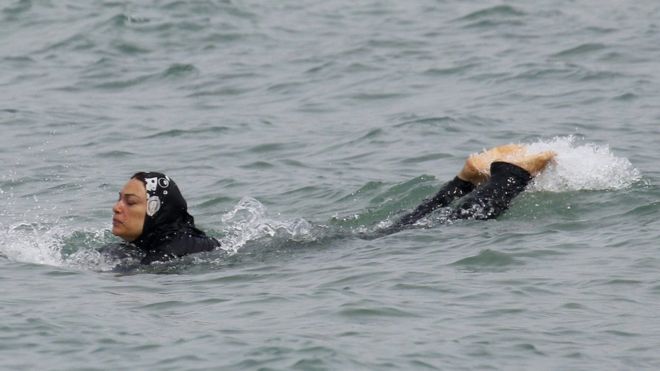France’s highest administrative court has suspended a ban on full-body “burkini” swimsuits that was imposed in a town on the Mediterranean coast.
The ban in Villeneuve-Loubet “seriously and clearly illegally breached fundamental freedoms”, it found, including freedom of belief.
The ruling could set a precedent for up to 30 other towns that imposed bans on their beaches, chiefly on the Riviera.
The court will make a final decision on the legality of the bans later.
Correspondents in France say the court’s decision means that all the bans on burkinis are likely now to be overturned but one mayor in Corsica has already vowed to keep the ban in place on his town beach.
A human rights group, the Human Rights League (LDH), and an anti-Islamophobia association (CCIF), brought the ban in Villeneuve-Loubet to the court’s attention.
Patrice Spinosi, a lawyer for the LDH, said outside court that people who had been fined could claim their money back.
Amnesty International welcomed the court’s decision. The human rights group’s Europe director, John Dalhuisen, said it had “drawn a line in the sand”.
He said: “French authorities must now drop the pretence that these measures do anything to protect the rights of women.
“These bans do nothing to increase public safety but do a lot to promote public humiliation.”
The burkini bans have ignited fierce debate in France and worldwide.
Opinions polls suggested most French people backed the bans, which town mayors said were protecting public order and secularism.
Muslims said they were being targeted unfairly.
The “burkini bans” actually make no mention of the burkini.
The rules simply say beachwear must be respectful of good public manners and the principle of secularism.
The controversy intensified after pictures and video of police appearing to enforce the ban by making a woman take off an item of clothing prompted widespread anger.
The court said local authorities did not have the power to restrict individual liberties in this way without “proven risk” to public order.
After a militant Islamist ploughed a lorry into families on the seafront at Nice on 14 July, killing 86 people, the city’s authorities said a ban was “a necessity”.
Local leaders have described their actions as appropriate and proportionate.
But the bans are not just a response to a spate of deadly jihadist attacks on French soil. France has long-standing laws on secularism, and the Nice ban focused on “correct dress, respectful of accepted customs and secularism, as well as rules of hygiene and of safety in public bathing areas”.
BBC
 Q FM Africa's Modern Radio
Q FM Africa's Modern Radio
